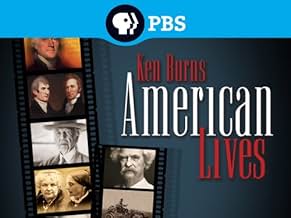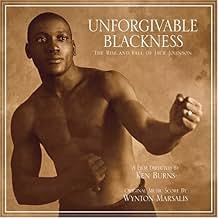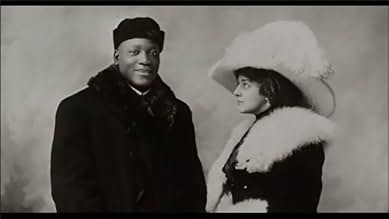Er wollte kein Sklave sein
Originaltitel: Unforgivable Blackness: The Rise and Fall of Jack Johnson
IMDb-BEWERTUNG
8,3/10
1762
IHRE BEWERTUNG
Füge eine Handlung in deiner Sprache hinzuThe story of Jack Johnson, the first African-American Heavyweight boxing champion.The story of Jack Johnson, the first African-American Heavyweight boxing champion.The story of Jack Johnson, the first African-American Heavyweight boxing champion.
- 3 Primetime Emmys gewonnen
- 4 Gewinne & 5 Nominierungen insgesamt
Jack Johnson
- Self
- (Archivfilmmaterial)
José Torres
- Self - Former Light Heavyweight Champion
- (as Jose Torres)
W.C. Heinz
- Self - Sportswriter
- (as W. C. Heinz)
Keith David
- Narrator
- (Synchronisation)
Samuel L. Jackson
- Jack Johnson
- (Synchronisation)
Adam Arkin
- Other Voices
- (Synchronisation)
Philip Bosco
- Other Voices
- (Synchronisation)
Kevin Conway
- Other Voices
- (Synchronisation)
Brian Cox
- Other Voices
- (Synchronisation)
John Cullum
- Other Voices
- (Synchronisation)
Murphy Guyer
- Other Voices
- (Synchronisation)
Empfohlene Bewertungen
Ken Burns has done an amazing documentary on the life of Jack Johnson -but even more amazing is the story he tells of the times in which Johnson lived. There is still racism in this country, for sure - one wants to believe that at least in most parts of the country, it is a little more circumspect than racism was during Johnson's life. This documentary provides a truly astounding look at this country at the beginning of the century, and a lot of it is unattractive. Johnson, called "The Ethiopian," could not go after the heavyweight title because the white fighters swore no black man would ever have it. When he finally did get it, Jim Jefferson, the undefeated champion, who had refused to fight Johnson, was dragged out of retirement 10 years and 100 pounds later to try to reclaim the title. He failed, and commented that in his prime, he could never have beat Johnson.
In his belief system, Johnson came up against a contemporary, Booker T. Washington, who believed that, rather than worry about segregation, blacks should build a power, education, and money base first. Johnson preferred to live as if segregation did not exist. He lived in white neighborhoods, moved his mother into one, flaunted his money, and consorted with white women. His quest for individualism cost him dearly. He bucked a system that simply would not stand for it.
This is a fascinating piece of our history, one that should not be missed.
In his belief system, Johnson came up against a contemporary, Booker T. Washington, who believed that, rather than worry about segregation, blacks should build a power, education, and money base first. Johnson preferred to live as if segregation did not exist. He lived in white neighborhoods, moved his mother into one, flaunted his money, and consorted with white women. His quest for individualism cost him dearly. He bucked a system that simply would not stand for it.
This is a fascinating piece of our history, one that should not be missed.
As the author of a biography about Canadian heavyweight champion Tommy Burns, I can tell you Unforgivable Blackness didn't tell the whole story by portraying Tommy as a racist who had to be badgered into fighting Jack Johnson. Until Tommy Burns came along, all the heavyweight kings had been white Americans who openly drew the so-called 'colour line,' refusing to fight blacks. Tommy, who fought seven African-American boxers on his way up, announced the day that he won the title that he would take on all comers, regardless of race or religion. Among other things, Tommy Burns did the following: * Break the colour line by becoming the first white champ to fight a black boxer (Jack Johnson). * Become the first champ to give a Jewish boxer (Joseph Smith) a crack at the title. * Married a black woman. * Hire two black sparring partners. * Befriend and socialize with black fighter Billy Woods. Tommy Burns was a racist by the standards of 2007, often using the 'n' word in interviews. But by the standards of his era, he was a very progressive individual. And although director Ken Burns doesn't acknowledge it in his otherwise very good film, if it wasn't for Tommy Burns, no one alive today would know or care who Jack Johnson was. Dan McCaffery, author, Tommy Burns: Canada's Unknown World Heavyweight Champion
What a perfect documentary. What a master Ken Burns is. Unforgivable is the story of the indestructible Jack Johnson, the first black heavyweight boxing champion, whose legendary style downed even the toughest white contenders inside the ring, and sent almost every white American into a frenzy of racial contempt for him, outside the ring.
Jack Johnson is such a rich subject; it seems we could never tire of him. He was the rags to riches American dream. He was the champ who repulsed an entire generation of whites - refuting their fundamental belief that blacks were by nature inferior beings. He was the pioneer that paved the way for future black athletes, who had formerly been relegated to Negro leagues. And he was the social trailblazer as well, integrating with whites in unprecedented and often dangerous ways.
Now Burns has reconstructed his life in and outside the ring through this wonderful collection of photos, interviews, film reels and archival documents. In short, I've seen no other documentary that so pungently depicts the black struggle to be accepted, and indeed, free in America.
Jack Johnson is such a rich subject; it seems we could never tire of him. He was the rags to riches American dream. He was the champ who repulsed an entire generation of whites - refuting their fundamental belief that blacks were by nature inferior beings. He was the pioneer that paved the way for future black athletes, who had formerly been relegated to Negro leagues. And he was the social trailblazer as well, integrating with whites in unprecedented and often dangerous ways.
Now Burns has reconstructed his life in and outside the ring through this wonderful collection of photos, interviews, film reels and archival documents. In short, I've seen no other documentary that so pungently depicts the black struggle to be accepted, and indeed, free in America.
As a youngster I heard about this man Jack Johnson. Even then I thought those same stories were fiction. Afterall, no one could convince me that, in the early 1900's a black, Negro, could have possibly conducted his life in such a way to disdain social mores not only to the degree in and of itself, but more so in his audacity.
Marrying and dating white women?? Come on. And he did not get killed? It shows that even for those times, America had this certain elasticity in dealing with a unique personality such as Johnson's.
This movie weaves his life thoughtfully, slowly (a 2 disc set after all) and with dignity. The voices that contributed to this story is so widely varied that I implore you to check the movie's credits. From Ed Harris, Kevin Conway, Samuel L. Jackson and the lead narrator, Keith David. But these voices aren't the complete range of contributors. For this kind of talent to come together is a testament to the power of the story and the pull that director Ken Burns commands.
Unforgivable Blackness ... is a powerful, thought provoking part of the American Experience. To that end, PBS deserves continued credit for bringing history to the masses.
Humbly Submitted and with deep emotions, Ron W.
Marrying and dating white women?? Come on. And he did not get killed? It shows that even for those times, America had this certain elasticity in dealing with a unique personality such as Johnson's.
This movie weaves his life thoughtfully, slowly (a 2 disc set after all) and with dignity. The voices that contributed to this story is so widely varied that I implore you to check the movie's credits. From Ed Harris, Kevin Conway, Samuel L. Jackson and the lead narrator, Keith David. But these voices aren't the complete range of contributors. For this kind of talent to come together is a testament to the power of the story and the pull that director Ken Burns commands.
Unforgivable Blackness ... is a powerful, thought provoking part of the American Experience. To that end, PBS deserves continued credit for bringing history to the masses.
Humbly Submitted and with deep emotions, Ron W.
I saw this film at the 2004 Toronto International Film Festival. It may seem hard to believe, but I've never seen a Ken Burns film. I've always meant to, of course, but watching a multi- part documentary series is something of a commitment. So I jumped at the chance to see an entire film in one sitting. Clocking in at an impressive 218 minutes (and including a short intermission and a lively Q&A session, I was in the theatre for almost 4½ hours), I was hoping that the quantity would be matched by the quality. I was not disappointed.
Jack Johnson was a true original. The first black man to hold the heavyweight boxing championship, he was a self-assured man who dressed well, drove fast cars, and kept white women as girlfriends. While not unusual now, this was highly irregular a hundred years ago, at a time when black lynchings were at their peak and the press regularly printed offensive cartoons to go along with its racist rhetoric. In the ring, he was a highly intelligent boxer, favouring a defensive style unknown in his day. He was also incredibly sensitive and articulate, especially for a man with only five years of formal education. But the struggles Johnson faced were almost insurmountable. No white champion would agree to fight a black man. Jim Jeffries preferred to retire undefeated rather than face Johnson, and Johnson had to travel around chasing champ Tommy Burns, hounding him to give him a title shot. When Burns finally agreed to a fight in 1908 (for a purse of $35,000, an unbelievable sum in those days), the contest wasn't even close, with Johnson dancing around, taunting his opponent, and talking to people in the ringside seats. The police stepped in during the fourteenth round to prevent him from knocking out the badly beaten Burns.
Johnson held the title from 1908 until 1915, with his most famous bout in 1910, against ex- champ Jeffries, whom he soundly defeated. This led to race riots all over the country, and many people were killed. From the moment he won the championship, it seemed that white society looked for ways to discredit him. The press were relentless, printing hostile editorials and calling for a "Great White Hope" who would return boxing's crown to its rightful place (and race). When a 37-year old Johnson finally lost the championship to Jess Willard, a giant man ten years his junior, it seemed to many that the black race had been taught an important lesson.
Johnson's life was troubled, and he continued to face persecution from the press and even law enforcement, who prosecuted him on charges related to his "debauchery" with white women. He eventually served a year in prison. There would not be another black heavyweight champion until Joe Louis, 22 years later.
This is a remarkable film for many reasons. First of all, in the little-known story of Jack Johnson, Burns has found a microcosm of the racial situation of the day, and one that has many echoes even now. Muhammad Ali, after seeing James Earl Jones portray Johnson in the Broadway play "The Great White Hope" (later made into a film), declared that Johnson's life story was similar to his own. A black man choosing to live as a free individual on his own terms is something that is still hard for some white people to tolerate.
Burns' film is also remarkable for the way in which it uses actual archival film of Johnson's bouts. Using silent film, Burns and his crew have added sound effects such as crowd noise and the sounds of blows connecting, and it gives these scenes the visceral punch they require. Finally, the superb "talking heads" (including the late George Plimpton, James Earl Jones, and the witty Stanley Crouch) and voice talent (Samuel L. Jackson is the voice of Johnson; others include Billy Bob Thornton, Derek Jacobi, Brian Cox, and Alan Rickman) bring the extraordinary story of Jack Johnson vividly to life.
As an added bonus, you get to hear James Earl Jones say "balls". Twice.
(9/10)
Jack Johnson was a true original. The first black man to hold the heavyweight boxing championship, he was a self-assured man who dressed well, drove fast cars, and kept white women as girlfriends. While not unusual now, this was highly irregular a hundred years ago, at a time when black lynchings were at their peak and the press regularly printed offensive cartoons to go along with its racist rhetoric. In the ring, he was a highly intelligent boxer, favouring a defensive style unknown in his day. He was also incredibly sensitive and articulate, especially for a man with only five years of formal education. But the struggles Johnson faced were almost insurmountable. No white champion would agree to fight a black man. Jim Jeffries preferred to retire undefeated rather than face Johnson, and Johnson had to travel around chasing champ Tommy Burns, hounding him to give him a title shot. When Burns finally agreed to a fight in 1908 (for a purse of $35,000, an unbelievable sum in those days), the contest wasn't even close, with Johnson dancing around, taunting his opponent, and talking to people in the ringside seats. The police stepped in during the fourteenth round to prevent him from knocking out the badly beaten Burns.
Johnson held the title from 1908 until 1915, with his most famous bout in 1910, against ex- champ Jeffries, whom he soundly defeated. This led to race riots all over the country, and many people were killed. From the moment he won the championship, it seemed that white society looked for ways to discredit him. The press were relentless, printing hostile editorials and calling for a "Great White Hope" who would return boxing's crown to its rightful place (and race). When a 37-year old Johnson finally lost the championship to Jess Willard, a giant man ten years his junior, it seemed to many that the black race had been taught an important lesson.
Johnson's life was troubled, and he continued to face persecution from the press and even law enforcement, who prosecuted him on charges related to his "debauchery" with white women. He eventually served a year in prison. There would not be another black heavyweight champion until Joe Louis, 22 years later.
This is a remarkable film for many reasons. First of all, in the little-known story of Jack Johnson, Burns has found a microcosm of the racial situation of the day, and one that has many echoes even now. Muhammad Ali, after seeing James Earl Jones portray Johnson in the Broadway play "The Great White Hope" (later made into a film), declared that Johnson's life story was similar to his own. A black man choosing to live as a free individual on his own terms is something that is still hard for some white people to tolerate.
Burns' film is also remarkable for the way in which it uses actual archival film of Johnson's bouts. Using silent film, Burns and his crew have added sound effects such as crowd noise and the sounds of blows connecting, and it gives these scenes the visceral punch they require. Finally, the superb "talking heads" (including the late George Plimpton, James Earl Jones, and the witty Stanley Crouch) and voice talent (Samuel L. Jackson is the voice of Johnson; others include Billy Bob Thornton, Derek Jacobi, Brian Cox, and Alan Rickman) bring the extraordinary story of Jack Johnson vividly to life.
As an added bonus, you get to hear James Earl Jones say "balls". Twice.
(9/10)
Wusstest du schon
- WissenswertesIt is stated that as a young man Johnson would sometimes "ride the rails" to find bouts in other towns.This does not mean buying a train ticket. The rails referred to are the iron foot rails attached to the underneath of boxcars by the sliding doors, that served as a footstep. Attached at the ends, with a crossbar at the center, one would lay down on their back and hold on, with a bedroll or rolled-up clothes serving as a cushion under the back.
- Zitate
Jack Johnson: I have found no better way in avoiding race prejudice than to act with people of other races as if prejudice did not exist.
- VerbindungenFeatured in Ken Burns: America's Storyteller (2017)
- SoundtracksGhost in the House
Composed and Performed by Wynton Marsalis
Top-Auswahl
Melde dich zum Bewerten an und greife auf die Watchlist für personalisierte Empfehlungen zu.
Details
- Erscheinungsdatum
- Herkunftsland
- Offizielle Standorte
- Sprache
- Auch bekannt als
- Unforgivable Blackness: The Rise and Fall of Jack Johnson
- Drehorte
- Minneapolis, Minnesota, USA(Minnesota)
- Produktionsfirmen
- Weitere beteiligte Unternehmen bei IMDbPro anzeigen
- Laufzeit
- 3 Std. 34 Min.(214 min)
- Farbe
- Sound-Mix
- Seitenverhältnis
- 16 : 9
Zu dieser Seite beitragen
Bearbeitung vorschlagen oder fehlenden Inhalt hinzufügen































